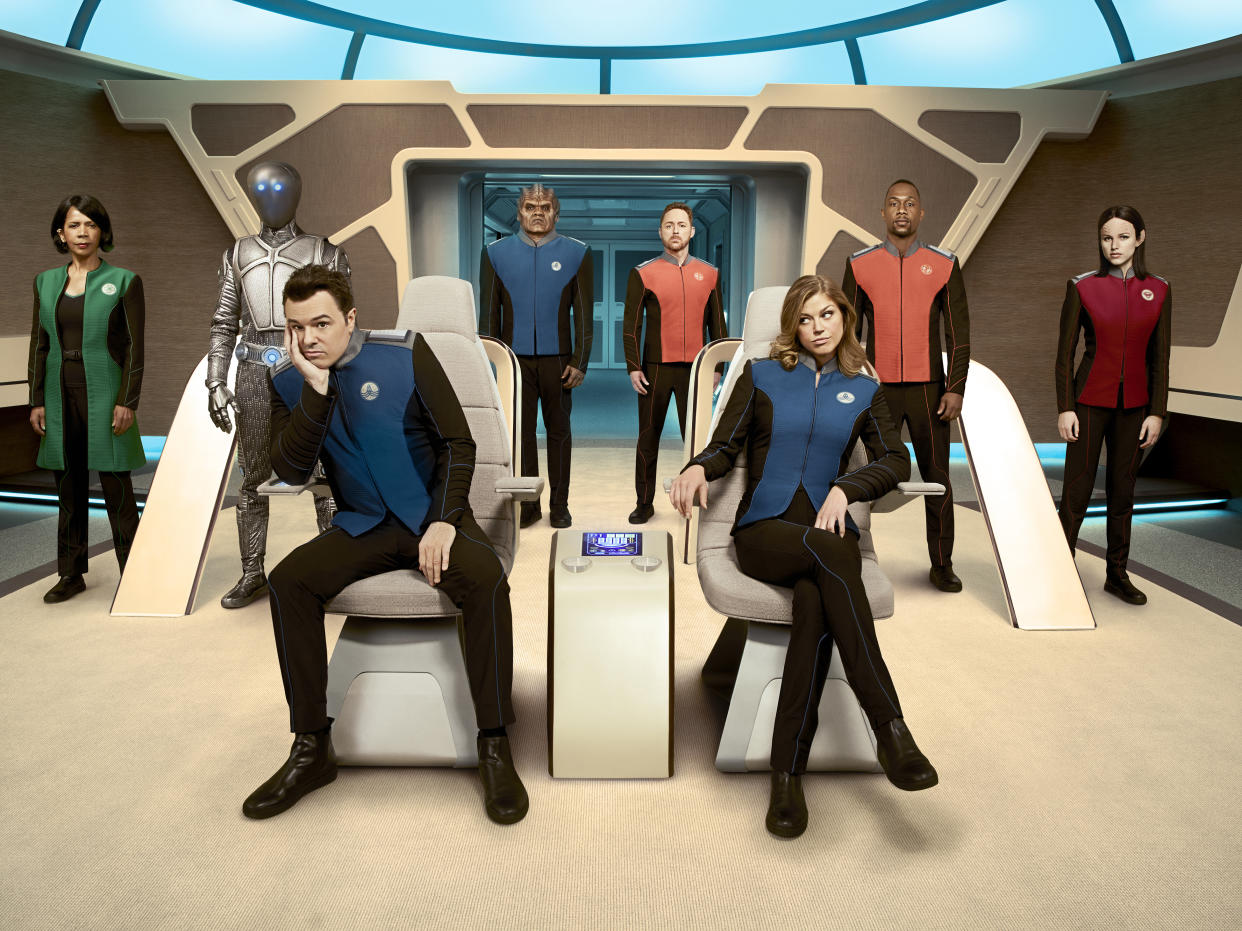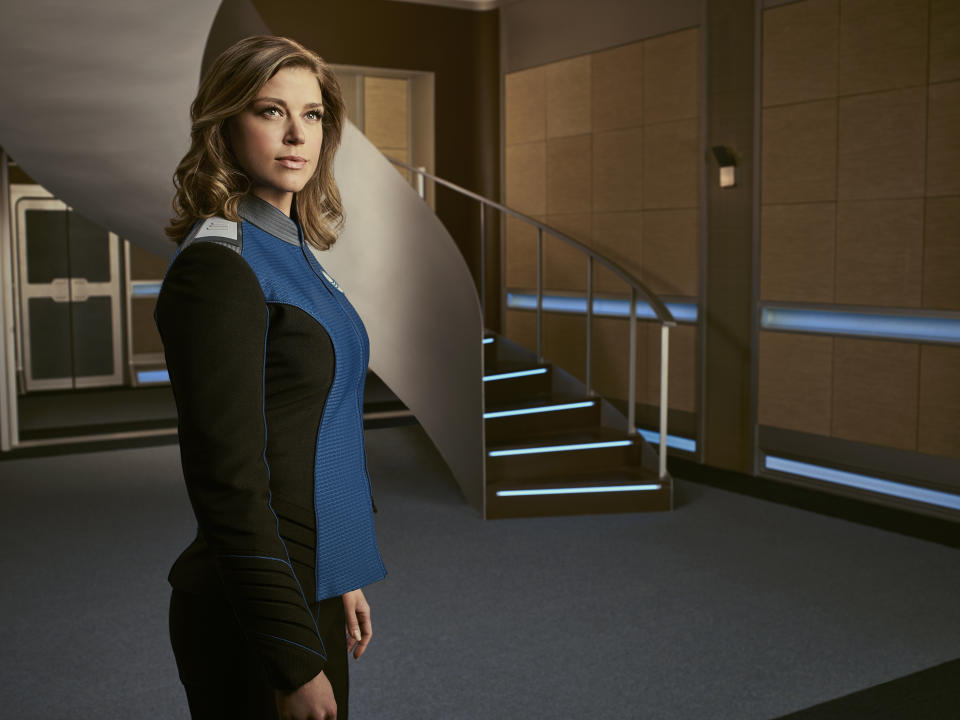Step on board 'The Orville' and go back to the future

Stage 15 looks like any of the other giant, warehouse-like buildings on the Fox lot. Just inside the enormous doors are strewn chairs, boxes, a table laden with snacks, the backs of large wooden flats marked with indecipherable number combinations.
But just past that — once you set foot onto the U.S.S. Orville — it’s like you’ve been launched into another galaxy. “You put an engine on that thing,” jokes co-star Adrianne Palicki, “I feel like it’s gonna fly.” The enclosed area is a two-story set with crew quarters, a large mess hall, a sick bay, and a spiral staircase — yes, a spiral staircase on a ship 400 years in the future and billions of miles away — leading up to the capacious bridge. “You really start to feel like you’re in space,” she says.
That’s the goal of Seth MacFarlane’s new show, The Orville, premiering Sept. 10. It’s a throwback to the Next Generation era of Star Trek and the wave of episodic sci-fi shows that followed in its wake. The massive set — complete with a 90-foot viewscreen on the bridge that puts every VR console on the market to shame — is meant to immerse the cast and the audience in a world that is self-knowing without being snarky and uplifting without being saccharine.
Science fiction, says one of the show’s executive producers, Brannon Braga, “is largely dominated by dystopian visions of humanity’s future where children murder each other for food.” It’s not that he doesn’t like the grimness — he cites Black Mirror as his favorite TV show of the last 10 years — but that’s not what they’re going for. “Hunger Games, great movies. But do I want to live in that world? Would I want to go there? No,” he says. “Orville? Hopefully, people say, ‘God, I wish I was on that ship. That’s a fun place to be.'”
Everything about the show has been built to feel like a real world. The clothing of every alien has been designed and hand-sewn to reflect the psychology of the species. Over 5,000 makeup prosthetics have been made just for the first batch of episodes alone. Walk around the shuttle and you’ll find the scrapes and gouges you’d expect from being flung around as exploratory spaceships are.

That kind of attention to detail not only makes it easier for the cast (and, by extension, the audience watching them) to believe in a far-flung future, it also makes it easier for them to bond as crew. “I have dinner with these people on our one day off,” says Palicki, with a tone approaching incredulity. “We go to dinner every Saturday and we just saw each other the entire week. That’s such a rare thing.”
Though the show is a comedy from MacFarlane, Braga says it’s less Family Guy and much more like his feature film Ted: “It’s really funny, but you actually give a s**t about what happens.” Which is to say the relationships are just as important as the jokes. “The emotional stakes were real in that movie, and making Ted real is not so different from making the universe of The Orville real,” he says.
“This isn’t Spaceballs or Galaxy Quest,” Braga continues. “We don’t think that a flat-out satire would sustain itself for that long.” In fact, like Ted, the core of the show is the relationships, according to Palicki. “This is the through line that I think is one of the most important in the show,” she says of her and MacFarlane as divorced couple Ed Mercer and Kelly Grayson. “It’s at the heart of it. The will-they-or-won’t-they. The Ross and Rachel.”
That’s one of the reasons why MacFarlane brought Jon Favreau on board to direct the pilot, Braga says. Establishing the tone early on is key, and Favreau is known for infusing his comedies — including the holiday classic Elf — with heart. “Elf was hilarious, but it actually had a good story and it actually was kind of moving,” Braga says. “There were real emotional stakes in it. So he was the perfect person to set the tone for us.”
Braga is thrilled to be doing this sort of television again. He worked his way up from intern at Star Trek: The Next Generation to showrunning Voyager and co-creating Enterprise. There is almost nobody in the world with the experience he has in this genre, but there have been few examples of it in the last decade. Hour-long episodic dramas are almost exclusively police procedurals now. “I personally missed this form of storytelling greatly,” he says. “I like a beginning, middle, and end. It’s the kind of thing I think, traditionally, Star Trek was its best [at], when it did this kind of stuff.”
It’s an homage to a bygone era updated with the sensibility and technology — and enormous budget — of today. The love for that Roddenberry-influenced style of sci-fi is evident in every frame, which will make for an interesting comparison when the new Star Trek: Discovery series premieres later this month on CBS All Access. But for Braga, there is no comparison. “I don’t know what they’re doing over on Star Trek, but this is certainly bigger than any Star Trek I’ve ever been involved with,” he says. And if anyone would know, it would be him.
The Orville has a special two-night premiere Sunday, Sept. 10 at 8 p.m. and Sept. 17 at 8 p.m., following NFL doubleheaders, on Fox. It airs Thursdays at 9 p.m. starting Sept. 21.
Read more from Yahoo TV:
‘Outlander’ Season 3: Stars preview how Claire and Jamie will ‘fall in love again’
Review: ‘Top of the Lake’ Season 2
‘The Walking Dead’: Take our ultimate trivia quiz
